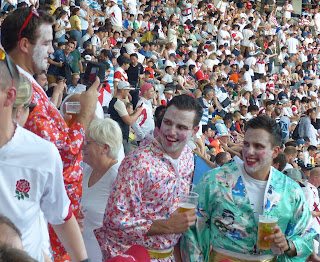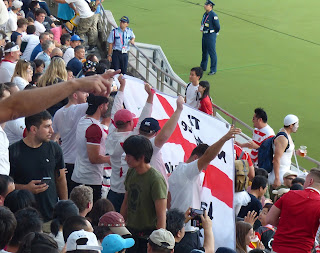 The 2019 Rugby World Cup was the catalyst for our Japan trip. We'd both been interested in visiting the country, but it was the convergence of my husband's favourite sport and England's chances of doing well that encouraged us to make the commitment.
The 2019 Rugby World Cup was the catalyst for our Japan trip. We'd both been interested in visiting the country, but it was the convergence of my husband's favourite sport and England's chances of doing well that encouraged us to make the commitment.Other than the three games that came as part of our package, I didn't think rugby would have that much of an influence on the trip. I was wrong. The tournament created a remarkable sense of fellowship with other travellers. Even under normal circumstances, I'd guess that you're more likely to strike up conversations with strangers in a place this foreign when you hear a familiar accent. But the minute you discovered someone was here for the rugby, the reserve fell. "I may not know you," you could almost hear the other person thinking, "but if you like rugby enough to travel all this way to see it, you're like me." Rugby fans are a convivial bunch, fond of good food and good drink, with a code of honour that respects other teams' fans as much as your own. It's a good recipe for social success.
Conversations were easy: everyone was keen to talk about their team's chances, the games they'd been to, the sometimes crazy lengths they'd gone to to get here. And I do mean everyone. In three weeks we encountered perhaps six English-speaking fellow travelers who were not there for the rugby. The tournament had clearly hijacked all tourism during its run.
It captivated the Japanese as well.
Rugby is a niche sport in Japan. Though the Japanese team had had some notable successes before the tournament started ... most memorably a win over South Africa in the 2015 World Cup ... they weren't a top-ranked squad and most people in the country follow other sports. So visitors were surprised by how the locals threw themselves into the event. Japan emerging from the qualifying round undefeated no doubt helped; cherry blossoms rugby shirts were the must-have, and most difficult to find, item of sportswear in Japan. I wore mine sightseeing one day and couldn't get over how many Japanese people thanked me for my support. Walking by locals in their kit after Japanese games and congratulating them on their wins was a joyous experience. I've seldom seen human faces so overwhelmed with delight. The government had also stated its intent to make the World Cup a test run for next year's Olympics.
Local enthusiasm had started early. The British merchandise manager we spoke to in Tokyo's pop-up World Cup store explained that the uninspiring range of goods on display was largely because the locals had swept in as soon as the tournament opened and bought massive amounts. The store had stocked national team shirts with the 2019 tournament logo on it for visiting supporters; they were snapped up by the Japanese. Who then turned out in force at all the games, often dressed to support whoever was playing and singing along, with the help of karaoke-style words on the big screens, to everyone's national anthems. One Japanese guy even gained fame by travelling around the country going to most games and painting team jerseys on his naked torso. He made the world news, of course, in his own.
This was all the more remarkable as I remembered another sport's World Cup played in a country where the game was niche. I was still living in the USA when FIFA'S 1994 football tournament took place there. My company was a sponsor, primarily to provide corporate entertainment to European and South American clients. When it came to locals, we couldn't give our ticket allocation away. Nobody cared. There was little news coverage. Dallas was a host city, but I remember little indication anything out of the ordinary was happening besides banners in our offices.
The Japanese, thankfully, took a very different approach.
The volunteers were even more amazing, though positive attitude was often stronger than knowledge of English or the ability to help. We lost half an hour in Kobe trying to follow some cryptic instructions, but eventually got to the right subway line. Every major train station had a rugby-branded help desk throughout the tournament and staffing swelled on game days to include pathfinders along key routes and armies of volunteers around the stadium. There was a rumour going around that the government had marshaled the enormous numbers as a deterrent to the types alcohol-fueled fan conflicts they learned to fear after the FIFA World Cup there in 2002. Fortunately rugby's genial fans demonstrated that they are cut from a different cloth.
Each game had a fan zone with far more host-city delights than I remember from my Rugby World Cup outing in London four years ago. You could nibble on a range of local food ... including BBQ Kobe beef and takoyaki octopus balls, learn to be a Ninja, participate in Japanese craft projects, watch a Samurai costume exhibition or pose in a variety of selfie set-ups. The last, we'd learned by our first game, being perhaps the most Japanese element of all.
The most popular booth at both games we attended was one giving out kamikaze style headbands with Japanese phrases written on them. In Kobe volunteers wrote them for you. In Tokyo you tried your own hand copying from a board of possible options. I chose "Victory". Piers went for "England". The most magical interaction with the locals, however, came at the end of the games, when all of the volunteers lined the paths out of the stadium and thanked us for coming, creating corridors of people giving us "high 5s" as if we'd played in the game ourselves. It was one of the most delightful things that's ever happened to me at a sporting event.
We were supposed to attend three games, but Typhoon Hagibis cancelled the England v. France match. (The outcome of the pool had already been determined by that stage, so the game was deemed unnecessary.) While we understood play was impossible, it was a blow to have a third of our rugby experience wiped away when we'd come that far. Thank heavens we'd added the USA game or, like many on our tour, we would have paid a fortune and travelled far to see just one live match.
I had other reasons for enjoying the American game, of course. There was never any chance that the USA would beat mighty England. The Americans are very good at sevens, the form of the game played in the Olympics and therefore better funded. Rugby in its 15-player form there is probably even more niche than it is in Japan, and the team has only ever beaten a world top 10 team once. (Scotland was having a very bad day.) But American rugby fans ... especially those who travelled for the tournament ... seem to have an almost messianic zeal about their sport. They strike up instant fellowship with anyone who might feel the same way. I've never hugged so many strangers in my life, nor taken photos with them. For that day, it felt like I suddenly had an enormous family of cousins who'd all turned up in Japan for a very boozy reunion.
The alcohol helped assuage the pain of the 45-7 loss. (It would have been a total wipe out had the English not gotten greedy just before the final whistle, thought they'd go for one more try and sloppily lost control of the ball.)
English fans may be more restrained, but Twickenham-style fun followed them to Japan with choruses of "Swing Low, Sweet Chariot", silly hats and a handful of people in fancy dress. Henry VIII and one of his wives sat behind us (a noble costuming sacrifice in the humid heat), there was the usual complement of crusader knights and a group making a strange attempt to be fish and chips. But the best dressed prize went to three guys in kimono and face paint playing the role of Gilbert & Sullivan's "Three Little Maids". What other sport comes with cross-dressing and allusions to 19th century operetta?
The Argentines, our opponents for the second match we attended, come with a whole songbook of greatest hits, musical instruments and prodigious vocal chords. We rather admired their ability to keep up a continuous racket, with dance moves, but it got irritating once play started and you actually wanted to pay attention to the game. Thankfully, their spirits diminished early on when one of their men got sent off with a red card, and sank to acceptable levels as we started to trounce them. (Final score 39-10.)
I thought rugby would be a sideline of the trip. It was, instead, a constant, bringing us fine company and high spirits throughout. I'm sure the Japanese would have been gracious hosts at any time, but in that window ... with the joy of the tournament and the national team doing better than expected ... the whole country was on a high. They've set a tough example to follow. 2023 is practically local. Just a quick hop over the channel. But will the French ever be able to match the giddy joy of the Japanese atmosphere? We'll just have to wait and see.







No comments:
Post a Comment